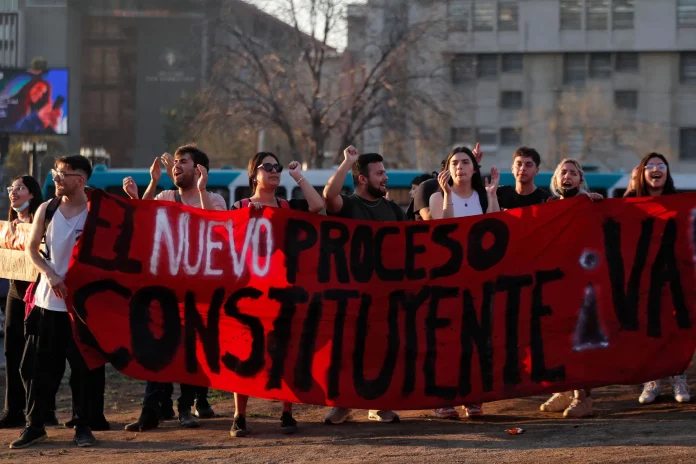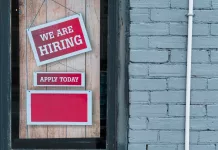
Last week, the Law Society invited professors Sergio Verdugo and Sonsoles Arias of IE University to discuss the failed ratification of one of the most progressive constitutions in the world.
Chile’s citizens voted against the proposal in September by 62%, a surprise after a 2020 plebiscite in which citizens overwhelmingly endorsed the formation of a new democratic constitution. As Verdugo discussed in his presentation on the downfalls of the Chilean constitution, the rejection was most likely due to the dysfunctional process and content of the proposal rather than satisfaction with the current constitution.
Chile’s current constitution is a relic of its dictatorship under Augusto Pinochet from 1973 to 1990 after he and his junta regime felled the then-socialist government in a coup d’etat supported by the US. Though the regime proposed a democratic turn for the country, it was marked by political violence as the military held the nation in an iron fist. Conservative yet economically neoliberal, the regime buried Chile’s economy with radical back-to-back economic policies, such as the elimination of import tariffs and mass privatisation that resulted in widespread poverty, debt, and unemployment.
After the fall of the regime in 1990, Chile injected real democracy into its society, eventually becoming one of the most politically stable and richest countries in Latin America. Yet, the Pinochet constitution still remains. The right-wing parties advocated for its continued use to maintain Pinochet’s legacy, while the left argued for change. The parties eventually agreed to keep the old constitution but amend it gradually to reflect the sentiments of the modern Chilean populace.
In 2005, under former president Ricardo Lago, the nation began calling for reform, believing that the country could not move away from its traumatic past if its constitution, no matter how changed, was entrenched in the dictatorship.
Verdugo provided a metaphor for the Chilean conception of the constitution: if someone were to take a table and saw off its legs little by little and turn it into a chair, it would of course not be the same table it was before. However, he pointed out, “because you made the changes gradually, nobody recognizes the table as the chair it is meant to be, because it’s still connected to the Pinochet regime.”
Thus, Lago’s administration removed most of the authoritarian provisions from the document, and created a completely different political system. It included a multi-party government and increased the importance and usage of political review. However, it was still not enough to convince the population that growing inequality and inept political action was not a side effect of the ever-present Pinochet constitution.
Bachelet’s administration once again tried to rewrite Chile’s national document in 2017. It was written through government-organised political assemblies. They aimed to create a constitution from the bottom up, without the Congress’ opinion. The Congress rejected the proposal.
Finally, student movements started a violent social outbreak in 2019, protesting against inflated metro ticket prices. This, compounded with protests from other social rights groups, prompted the latest attempt at constitutional reform. Although Verdugo supported this undertaking, he claims that it was started for the wrong reasons. He stated that the lack of social rights and increasing inequality in Chile was due to its legislators’ low political inertia to enact much-needed laws. In his opinion, “enacting a new constitution to solve these issues is not necessarily a solution, because constitutions are not made for that.”
Furthermore, Verdugo noted that the proposed constitution didn’t actually solve Chile’s initial problem. Due to Chile’s disenchantment with Congress’ contributions to the country’s legal landscape, it barred all political parties from the constituent assembly. Instead, they elected single-issue social movement groups and independents; who were unseasoned in political campaigning outside of their focuses, and unprepared for the constitution-making process.
The constituent assembly was formed by a diverse group of social rights activists and included 17 reserved seats for indigenous people. Citizens called for better healthcare, education, and housing; once combined with the interests of the new pseudo-politicians, the Bill of Rights included over 100 rights, making it one of the longest in the world. The overwrought Bill of Rights was a sign of the constitution’s failure. Verdugo noted, “If you know anything about constitutional design you’ll know that having more than 100 rights means not having rights. If everything is fundamental, then nothing is fundamental.” Though the proposal was progressive on the surface, it was too vague and incohesive to ensure proper enforcement of its rules and protections.
The almost 400 hundred articles included in the document were even more problematic. A nation’s constitution does not distinguish and mitigate possible future events. Instead, they form general laws that reflect the scope of fundamental rights, federal organisation, and national identity that all countries need for successful governance. However, instead of formulating a long-term direction for the country and accounting for the average voter’s ideals, each group that made up the convention advocated solely for their respective movements; creating an ultra-liberal document before the nation’s willingness to accept all such values.
A majority of Chile’s population is now in the political middle. They call not for an elaborate policy platform, but one that sustains balanced power, economic growth, and provides a social safety net. September’s referendum was a wake-up call for the country’s government and policy-makers. As citizen José Burgar told AFP, “I can assure you that changes are needed, undoubtedly there are going to be changes, but then we need a good constitution, a constitution that represents us all.”







